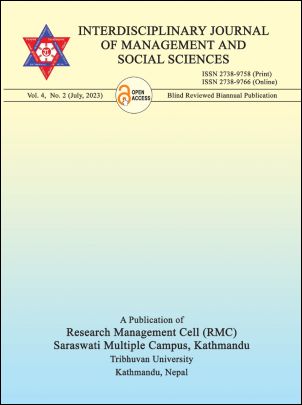The Changing Landscape: Sustainability of Nepalese Microfinance Institutions (MFIs)
DOI:
https://doi.org/10.3126/ijmss.v4i2.57219Keywords:
Employment creation, financial sustainability, Poverty alleviation, social business, social changeAbstract
The primary goal of this research is to identify changing landscapes Nepalese microfinance institutions (MFIs) in order to achieve outreach and sustainability. This is a descriptive research design. Typically, a microfinance program is designed to assist the poor and marginalized Nepalese women who are unable to access government and institutional financial services by focusing on modest loans with short terms, no collateral, and monthly payments. MFIs, on the other hand, have major challenges in terms of social and economic transformation, as well as long-term viability. In the Nepalese scenario, most of the microfinance institutions hold traditional dimensions till now and these need to be modified to bring the social transformation to equip with globalized cultural practices through social business. The study's findings indicate that zero poverty, zero unemployment, zero carbon emissions, zero loan default, zero loan abuse, zero over-indebtedness, and zero credit renewal goal can achieve rough microfinance institutions. The findings of the study might be applicable to the BFIs, MFIs, regulatory authorities, HR analyst, economist and planners.

